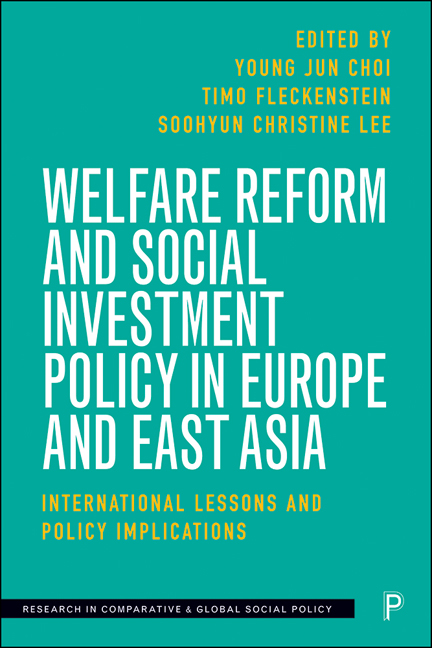 Welfare Reform and Social Investment Policy in Europe and East Asia
Welfare Reform and Social Investment Policy in Europe and East Asia Book contents
- Frontmatter
- Contents
- List of figures and tables
- Notes on contributors
- Acknowledgements
- Preface from the series editors
- 1 Introduction: social investments and welfare reform in Europe and East Asia
- 2 Work–family policy expansion and the idea of social investment: the cases of Germany, England, South Korea and Japan
- 3 Private education in South Korea: lessons for the West from past mistakes?
- 4 How do family background and shadow education affect academic performance and labour market outcomes in South Korea? Reasons for redistributive social investment
- 5 Employability, higher education and the knowledge economy
- 6 Does social investment make the labour market ‘flow’? Family policies and institutional complementarities in Italy, Spain, Japan and South Korea
- 7 The social investment approach and gender division of housework across East Asia and Europe
- 8 Employment outcomes of social investment in latecomer countries
- 9 Estimation of the human capital depreciation rate: an international comparison and policy implications in South Korea
- 10 Changing patterns of grandparenting and their implications for active ageing in England and South Korea
- 11 The governance of social investment policies in comparative perspective: long-term care in England and South Korea
- 12 Towards greater social investments and equality in Europe and East Asia: policies and politics
- Index
2 - Work–family policy expansion and the idea of social investment: the cases of Germany, England, South Korea and Japan
Published online by Cambridge University Press: 21 December 2021
- Frontmatter
- Contents
- List of figures and tables
- Notes on contributors
- Acknowledgements
- Preface from the series editors
- 1 Introduction: social investments and welfare reform in Europe and East Asia
- 2 Work–family policy expansion and the idea of social investment: the cases of Germany, England, South Korea and Japan
- 3 Private education in South Korea: lessons for the West from past mistakes?
- 4 How do family background and shadow education affect academic performance and labour market outcomes in South Korea? Reasons for redistributive social investment
- 5 Employability, higher education and the knowledge economy
- 6 Does social investment make the labour market ‘flow’? Family policies and institutional complementarities in Italy, Spain, Japan and South Korea
- 7 The social investment approach and gender division of housework across East Asia and Europe
- 8 Employment outcomes of social investment in latecomer countries
- 9 Estimation of the human capital depreciation rate: an international comparison and policy implications in South Korea
- 10 Changing patterns of grandparenting and their implications for active ageing in England and South Korea
- 11 The governance of social investment policies in comparative perspective: long-term care in England and South Korea
- 12 Towards greater social investments and equality in Europe and East Asia: policies and politics
- Index
Summary
Introduction
Since the late 1990s, many countries in the Organisation for Economic Co-operation and Development (OECD) have introduced work–family reconciliation policies aimed at enabling families, and women in particular, to more easily balance the demands of employment and childcare. To this end, early childhood education and care (ECEC) services as well as childcare leave policies have been expanded across welfare states of different traditions and institutional origins, including, notably, East Asian welfare states (An, 2013; Ferragina and Seeleib-Kaiser, 2015; Daly and Ferragina, 2018).
Comparative explanations of this shift have highlighted a number of ‘new social risks’ that are facing modern welfare states (Bonoli, 2005). First, the decline of permanent, full-time employment that characterised industrial economies has eroded the feasibility of the ‘family’ wage, which underpinned many states’ support of the malebreadwinner model family (Lewis, 1992). Second is a growth in women's employment, which has occurred to different extents in different countries, as a response to the need for higher family incomes but also because of women's demands for inclusion in the public realm (Lewis et al, 2008). Third, the shift to service sector-dominated economies has placed a premium on skills and education, which are increasingly vital for labour market success in a globalised, knowledge economy (Bonoli, 2007). Fourth, there has been a decline since the 1970s of birth rates across high-income countries, a trend that has exacerbated the fiscal and social strains presented by demographic ageing (Castles, 2003). These challenges have created new demands for policies that support women's employment, improve education and address falling birth rates (Mätzke and Ostner, 2010a).
In attempting to meet these challenges, many countries have followed the example of social-democratic welfare states, which had introduced work–family policies in earlier decades (Leira, 1992; Ellingsater and Leira, 2006). In particular, this has involved increasing the availability, affordability and quality of ECEC and introducing or redesigning parental leave policies in order to encourage mothers to maintain labour market attachment after childbirth. Both the pioneering expansion in social-democratic countries and the more recent changes elsewhere have therefore been understood as constituting a shift away from norms and assumptions based on male-breadwinner model families that have underpinned social policy in most countries since the foundation of modern welfare states (Lewis, 1992).
- Type
- Chapter
- Information
- Welfare Reform and Social Investment Policy in Europe and East AsiaInternational Lessons and Policy Implications, pp. 27 - 60Publisher: Bristol University PressPrint publication year: 2021


